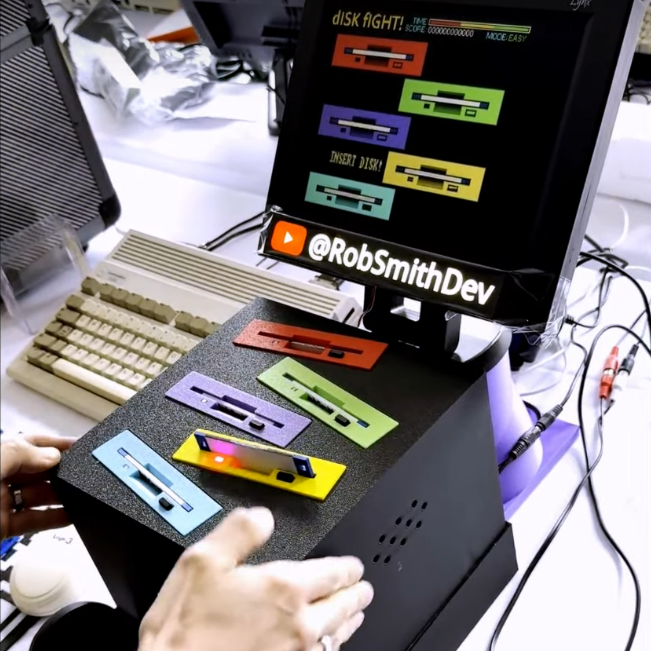
In an era where digital storage has moved far beyond the humble floppy disk, these once-ubiquitous data carriers have largely been relegated to the annals of technological history. However, they continue to find niche uses in certain industrial applications and, surprisingly, within the infrastructure of nuclear arsenals worldwide. Now, in a creative twist, a new game has emerged that repurposes these relics of the past into a playful homage to retro technology.
Dubbed “Whack-A-Disk,” this inventive game draws inspiration from the classic arcade game Whack-a-Mole, but with a unique twist that leverages the mechanical charm of floppy disk drives. The brainchild of an enthusiast known as [Rob], the game challenges players to manually push floppy disks into drives, a task that replaces the traditional mallet used in its arcade predecessor. This hands-on interaction with the hardware is just one of the many ways the game pays tribute to the bygone era of floppy disks.
A Creative Spin on Classic Gaming
Unlike the arcade classic, Whack-A-Disk introduces several floppy-disk-specific features. Notably, the game requires players to react quickly as disks sometimes eject from the drives unexpectedly. This mechanic adds an element of surprise and dexterity, demanding players to swiftly grab and reinsert the disks to score points. Remarkably, [Rob] achieved this without the need for high-powered solenoids, instead opting for a more subtle mechanical alteration of the drives.
The game runs on an Amiga 600, a computer that itself is a relic of the past, further enhancing the retro experience. Accompanying the gameplay is a custom-made soundtrack, crafted specifically for the 30-second gaming sessions, adding an auditory layer to the nostalgic journey.
Reviving Retro Technology
Creating Whack-A-Disk was no small feat. [Rob] embarked on a journey of trial and error, developing multiple prototypes before achieving a functional and engaging game. This dedication highlights a broader trend of enthusiasts finding new life in outdated technology, a movement that celebrates the ingenuity and creativity of repurposing obsolete hardware.
Floppy disks, once the cornerstone of personal computing, have largely disappeared from modern life. However, their iconic status endures, symbolized by the ubiquitous “save” icon in software applications. For many younger users, the symbol is a vestige of a technology they have never used, making Whack-A-Disk both a playful introduction and a nostalgic reminder of computing’s past.
The Broader Implications
The resurgence of interest in retro technology, as exemplified by Whack-A-Disk, underscores a cultural fascination with the tactile and mechanical aspects of older tech. This trend is not just about nostalgia; it reflects a desire to engage with technology in a more hands-on, personal way, contrasting with the intangible nature of modern digital interactions.
Experts in the field of digital preservation and retro computing note that projects like Whack-A-Disk serve an important role in keeping the history of technology alive. By repurposing old hardware, enthusiasts are not only preserving the physical devices but also the cultural and historical context they represent.
“The revival of obsolete technology through creative projects like Whack-A-Disk highlights the enduring value and fascination of the past,” said Dr. Emily Carter, a historian specializing in digital media. “These projects offer us a tangible connection to the evolution of technology.”
As technology continues to advance at a rapid pace, the allure of retro computing serves as a reminder of the roots of modern digital innovation. Whack-A-Disk is more than just a game; it is a celebration of the creativity and resourcefulness that can emerge from the intersection of past and present.
For those eager to experience this nostalgic journey, finding a compatible CRT monitor might be the final piece of the puzzle, though these too are becoming rarer than the floppy disks themselves. Nevertheless, the enduring appeal of retro technology ensures that projects like Whack-A-Disk will continue to captivate and inspire.







